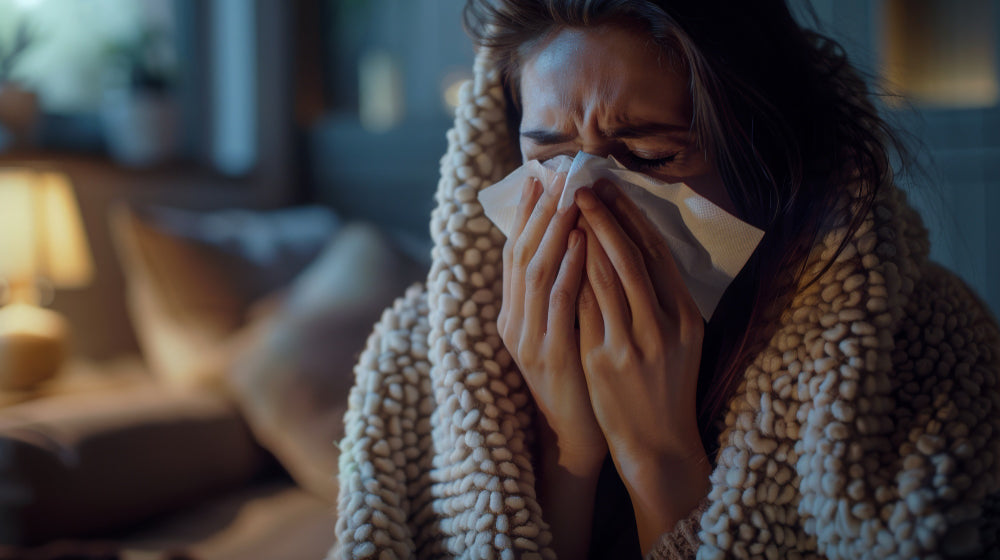As the winter months roll in, many of us brace ourselves for the inevitable wave of colds, flu, and other illnesses that seem to thrive in the chilly air. But why is it that we tend to get sick more often during this season? A combination of factors, including cold weather, indoor crowding, and reduced sunlight exposure, can take a toll on our immune systems, making us more vulnerable to infections. In this article, we’ll explore the reasons behind winter illnesses and provide practical strategies to help you strengthen your immune defences. From improving indoor air quality to incorporating immune booster supplements into your daily routine, we’ll equip you with the knowledge to keep you and your loved ones healthy all season long.
How Cold Weather Affects Your Immune System
Cold weather can significantly impact the body's immune response. When exposed to cold temperatures, blood vessels constrict to conserve heat. This reduction in blood flow can limit the delivery of white blood cells to the respiratory tract, making it easier for viruses to take hold.
Prevention: To counteract these effects, dress warmly when heading outdoors and maintain a stable indoor temperature. Staying hydrated is also crucial, as proper hydration supports circulation and overall health.
The Role of Indoor Air Quality in Spreading Illness
In winter, we spend more time indoors, which can lead to a higher concentration of viruses and bacteria. Dry indoor air can irritate the respiratory tract, further lowering your body’s defences against pathogens.
Prevention: To improve indoor air quality, consider using air purifiers and humidifiers. Regular cleaning and disinfecting surfaces, particularly high-touch areas, can help reduce germ spread.
Why Do Viruses Thrive in Cold Temperatures?
Many respiratory viruses, such as the flu and rhinovirus (responsible for the common cold), tend to thrive in cold, dry conditions. These viruses can survive longer outside the human body in winter, increasing the chances of transmission.
Prevention: Getting an annual flu vaccine can provide significant protection. Additionally, practising good hygiene, like frequent handwashing, can help mitigate the risk of infection.
The Link Between Less Sunlight and Vitamin D Deficiency
Winter days are shorter, resulting in decreased sunlight exposure, which can lead to vitamin D deficiency. This vitamin is essential for maintaining a healthy immune system, as it helps regulate the immune response.
Prevention: Make an effort to spend time outdoors during daylight hours when possible, even if it's just a short walk. Additionally, consider taking a vitamin D supplement to help maintain adequate levels, especially in areas with long winters.
Changes in Lifestyle During Winter That Weaken Immunity
During winter, many people become less physically active and may indulge in less nutritious foods. This combination can weaken the immune system and increase the likelihood of getting sick.
Prevention: Engage in regular physical activity, whether indoors or outdoors, and maintain a balanced diet rich in fruits, vegetables, and whole grains.
The Impact of Dry Winter Air on Respiratory Health
Dry air during winter can dry out the mucous membranes in the respiratory system, making it more difficult for your body to trap and eliminate pathogens, thereby increasing the risk of infection.
Prevention: Using a humidifier in your home can help maintain moisture levels in the air, protecting your respiratory health. Staying well-hydrated is also key.
Do We Really Get Sick from Being Cold? Separating Myth from Fact
Many believe that simply being cold can cause illness. While being cold doesn't directly make you sick, it can weaken the immune response and increase susceptibility to infections.
Prevention: Focus on maintaining a strong immune system through healthy lifestyle choices, including a balanced diet, regular exercise, and adequate sleep.
Why Children and the Elderly Are More Vulnerable During Winter
Children and the elderly generally have weaker immune systems, making them more susceptible to winter illnesses. Their bodies may not respond as effectively to pathogens, increasing their risk of infections.
Prevention: Ensure that vulnerable populations receive their vaccinations and that they maintain a healthy diet. Encourage regular handwashing and minimise exposure to sick individuals.
How to Boost Your Immune System for Winter Protection
A robust immune system can help ward off winter illnesses. Essential strategies include adequate sleep, effective stress management, balanced nutrition, and regular physical activity.
Prevention: Implement relaxation techniques, such as yoga or meditation, to manage stress effectively. A diet rich in antioxidants, vitamins, and minerals can provide the nutrients your body needs to function optimally.
Supplements to Boost Immunity:
immunity booster tablets, which may include vitamin C, zinc, elderberry, and echinacea, can play a supportive role in maintaining immune function during winter. While they are not a substitute for a healthy lifestyle, they can complement your efforts to stay healthy during the colder months.
By understanding the factors that contribute to increased illness in winter and taking proactive steps to bolster your immune health, you can enjoy a healthier season and reduce your risk of getting sick.
Final thoughts:
Winter illnesses become more common due to environmental factors, lifestyle changes, and physiological responses to the colder season. Cold weather, increased indoor activity, and reduced sunlight can all affect our immune systems. However, by adopting a proactive approach, such as dressing warmly, practising good hygiene, maintaining a nutritious diet, and staying physically active—you can significantly reduce your risk of falling ill. With these health-conscious habits, you and your loved ones can stay resilient and enjoy a healthier winter.

